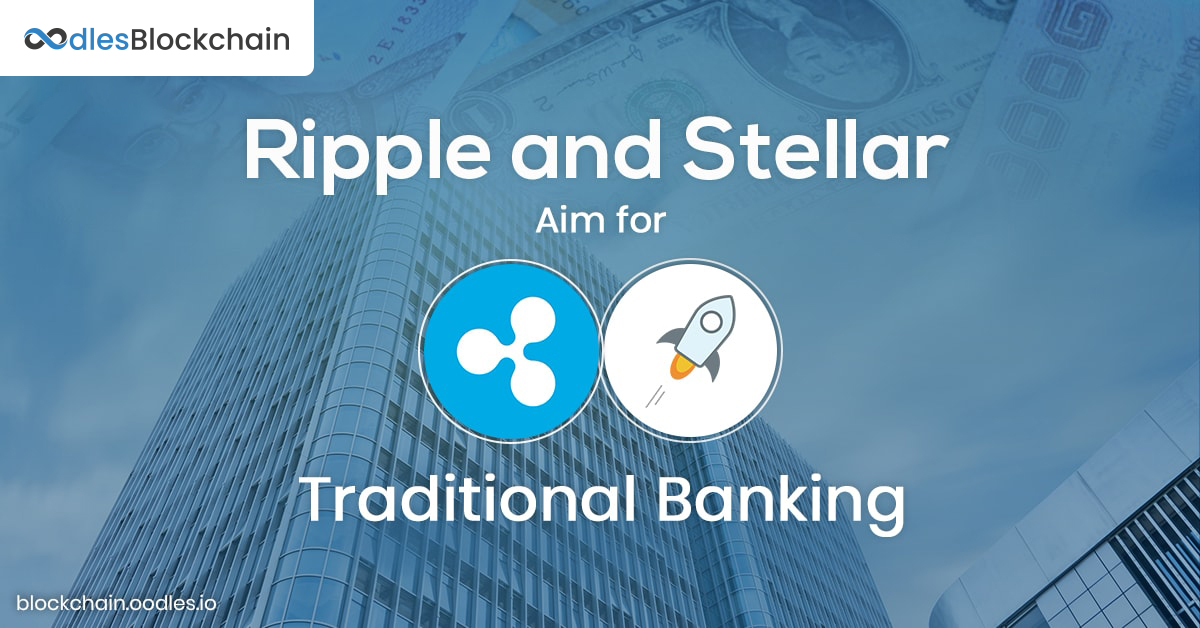-
CIOs and CTOs from different industries believe that blockchain certainly has the potential to enhance and optimize business processes and operations. They think that it can revamp processes, governance systems, and value exchange for a variety of businesses and industries. Currently, the industries that are most open to adopting blockchain technology are Banking and Fintech. Using blockchain, they are looking to create faster and cheaper global trading gateways with no dependence on intermediaries.
Remodelling Traditional Banking with Stellar and Ripple Blockchain
At the core of this new banking revolution, there are two prominent blockchain platforms, Ripple and Stellar.
These two blockchain platforms are bridging the gap between DLTs (distributed ledger technologies) and the existing financial architecture.
Promoted as the "future of finance and banking," Ripple and Stellar are creating blockchain based financial systems to address the problems the industry faces today.
Ripple's Roadmap: Revolutionizing the traditional banking system with decentralization
When Ripple was launched in 2013, its goal was to develop scalable, low-cost, and fast financial transactions processing solutions for banks globally. Surprisingly, after only one year of its launch, the blockchain startup bagged Fidor Bank as its first client. The Munich-based bank employed Ripple's payment processing system for its regional and international customers. Since then, Ripple Foundation has been collaborating with numerous financial entities and banks to provide decentralized payment solutions. It has partnered with Arabs where it got approval for an international payment deal with UAE Exchange for implementing a decentralized cross-border payment solution.
Also, the Saudi Arabia Monetary Authority, Arab's central bank, has permissioned Ripple to enable regional banks to beef up their payment processing capacities. It has asked to revamp domestic and international payments through xCurrent, a Ripple blockchain-based cost-effective, and transparent remittance settlement solution.
In November 2018, Ripple came into partnership with one of the prominent banks in Brazil called Bradesco. The cooperation enables the bank to execute seamless financial transactions within its 5,300+ branches and over 38,000 ATMs. The partnership also brings on the table the Brazil-Japan cross-border payment corridor, with industry giants like Mitsubishi and MUFG entering the pact.
In October this year, 60 Japanese banks controlling over 80% of banking assets in the country agreed upon using Ripple's Money Tap mobile app.
Ripple is being tagged as the blockchain technology that is gradually taking over SWIFT and VISA. Indeed, it is apparent with Ripple's rapid adoption by established financial institutions.
At the beginning of 2018, Ripple had partnered with 75 banks that were using its DLT solutions. Some of them include IndusInd Bank, PNC Bank, Banco Santander, BBVA, Akbank, Bank of America, and Standard Chartered, among many others.
Stellar's plan to enter the traditional banking and finance
Stellar is a blockchain technology-based platform for providing fast, efficient and secure financial transactions.
Stellar aims to advance global financial literacy, inclusion, and access by enabling fast and secure P2P (peer-to-peer) cross-border payment transactions.
You may think that Stellar moves might through traditional banking out of business but this is not the case. Indeed, the Delaware-based company is looking to work together with the traditional financial and banking system.
Instead of eliminating the processes and reinventing the wheel completely, it is focusing on collaborations with existing banks to realize its goals.
During the Exponential Financial conference held in Johannesburg South Africa in 2016, the CEO of corporate and investment banking at Barclays Africa, Stephan van Coller, discussed how the finance giant is piloting a distributed ledger system with Stellar's payments rails. The pilot program involved sixteen to eighteen years old students. It researches how smartphones can come in use as day-to-day payment solutions for the rapidly growing African population.
Recently, in October 2017 Stellar partnered with IBM to create a Blockchain World Wire (BWW). It's a distributed ledger system aimed to provide interbank transfers and cost-effective global payment systems.
Since the launch, BWW is being considered as a SWIFT replacement in the global payment scene by some industry enthusiasts. Not only this but Stellar also partnered with Deloitte Digital Bank to create a state-of-the-art, cost-effective banking system for the financial domain.
What established Stellar's place as a Blockchain platform penetrating through traditional banking is its acquisition of Chain. Chain is a San-Francisco based blockchain based startup. Its work is to build distributed ledger technology solutions for the financial system. Apart from its powerful presence in this industry, Chain boasts of having prominent investors like Citi Ventures, Visa, and Nasdaq.
Stellar's aim is to create cost-effective, high-performance, and modern financial systems for both individuals and businesses. However, it aims to do with a slightly different approach. Instead of reinventing the wheel through decentralization, Stellar works together with the existing financial system to develop decentralized solutions that can serve the needs of today's consumers.
Concluding Thoughts
Significantly, both the blockchain platforms have gained significant traction and established a stronghold in the digital payment solution space. Banks and financial institutions around the globe are developing payment solutions with Stellar and Ripple blockchain with an aim to increase efficiency and security in transactions.

Our Offices
INDIA
Emaar Digital Greens, Sector 61,
Gurugram, Haryana
122011.
Welldone Tech Park,
Sector 48, Sohna road,
Gurugram, Haryana
122018.













